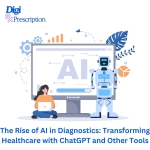Artificial intelligence (AI) is revolutionizing healthcare, with diagnostic tools powered by AI leading the charge. Among these, ChatGPT and similar conversational AI models are becoming indispensable aids for doctors, enabling smarter, faster, and more efficient diagnoses. This blog post explores how AI in diagnostics is reshaping healthcare and why it holds such promise for the future.
How AI Like ChatGPT Is Transforming Diagnostics
AI in diagnostics leverages advanced algorithms to analyze vast amounts of medical data, including patient records, imaging scans, and lab results. Tools like ChatGPT complement these systems by offering real-time assistance, summarizing data, and supporting medical decision-making.
Key Ways ChatGPT Is Assisting Doctors
-
On-Demand Medical Knowledge
ChatGPT provides instant access to reliable medical information, from rare disease explanations to the latest clinical guidelines. This allows doctors to save time and make better-informed decisions. -
Enhanced Patient Communication
Explaining complex conditions can be challenging. ChatGPT assists by generating clear, simplified explanations, improving patient understanding and satisfaction. -
Data Analysis and Decision Support
AI tools analyze patient symptoms and history, offering potential diagnoses or treatment suggestions. Paired with ChatGPT, these tools can provide more context, making it easier for doctors to evaluate options. -
Reducing Administrative Burden
Documentation is one of the most time-consuming tasks for healthcare providers. ChatGPT can draft patient summaries, reports, and notes, freeing up more time for patient care. -
Keeping Doctors Updated
With the constant stream of new research, it’s challenging for doctors to stay current. ChatGPT can summarize relevant studies and emerging trends, ensuring that professionals are always informed.
Real-World Examples of AI in Diagnostics
- Early Cancer Detection: AI models analyze imaging data to identify tumors in their earliest stages, boosting survival rates.
- Neurological Disorders: AI tools detect abnormalities in brain scans, aiding in the diagnosis of conditions like Alzheimer’s and Parkinson’s disease.
- Telemedicine Triage: ChatGPT-powered systems streamline telemedicine by gathering initial patient data and prioritizing cases based on urgency.
Benefits and Challenges of AI in Diagnostics
Benefits:
- Increased Accuracy: AI detects patterns that might escape the human eye, leading to better diagnoses.
- Faster Processes: Automating data analysis saves significant time in clinical workflows.
- Improved Accessibility: AI tools provide expert-level assistance to underserved areas.
Challenges:
- Data Privacy: Safeguarding sensitive medical information is a critical concern.
- Bias in AI Models: AI’s accuracy depends on the quality of the data it’s trained on, and biased data can lead to errors.
- Ethical Oversight: Decisions made by AI systems require human oversight to ensure patient safety and ethical care.
Future of AI in Healthcare Diagnostics
The future of AI in diagnostics is bright. With advancements in machine learning, natural language processing, and big data analysis, tools like ChatGPT will continue to enhance patient care. From predicting disease outbreaks to enabling real-time monitoring, AI is paving the way for a smarter, more accessible healthcare system.
Conclusion
AI in diagnostics, particularly tools like ChatGPT, is transforming the healthcare landscape. By enhancing accuracy, reducing workloads, and improving communication, these innovations are empowering doctors and patients alike. However, as we embrace these technologies, it’s essential to address challenges such as data security and ethical concerns to ensure their responsible use.
What are your thoughts on AI in healthcare? Let us know in the comments below!

